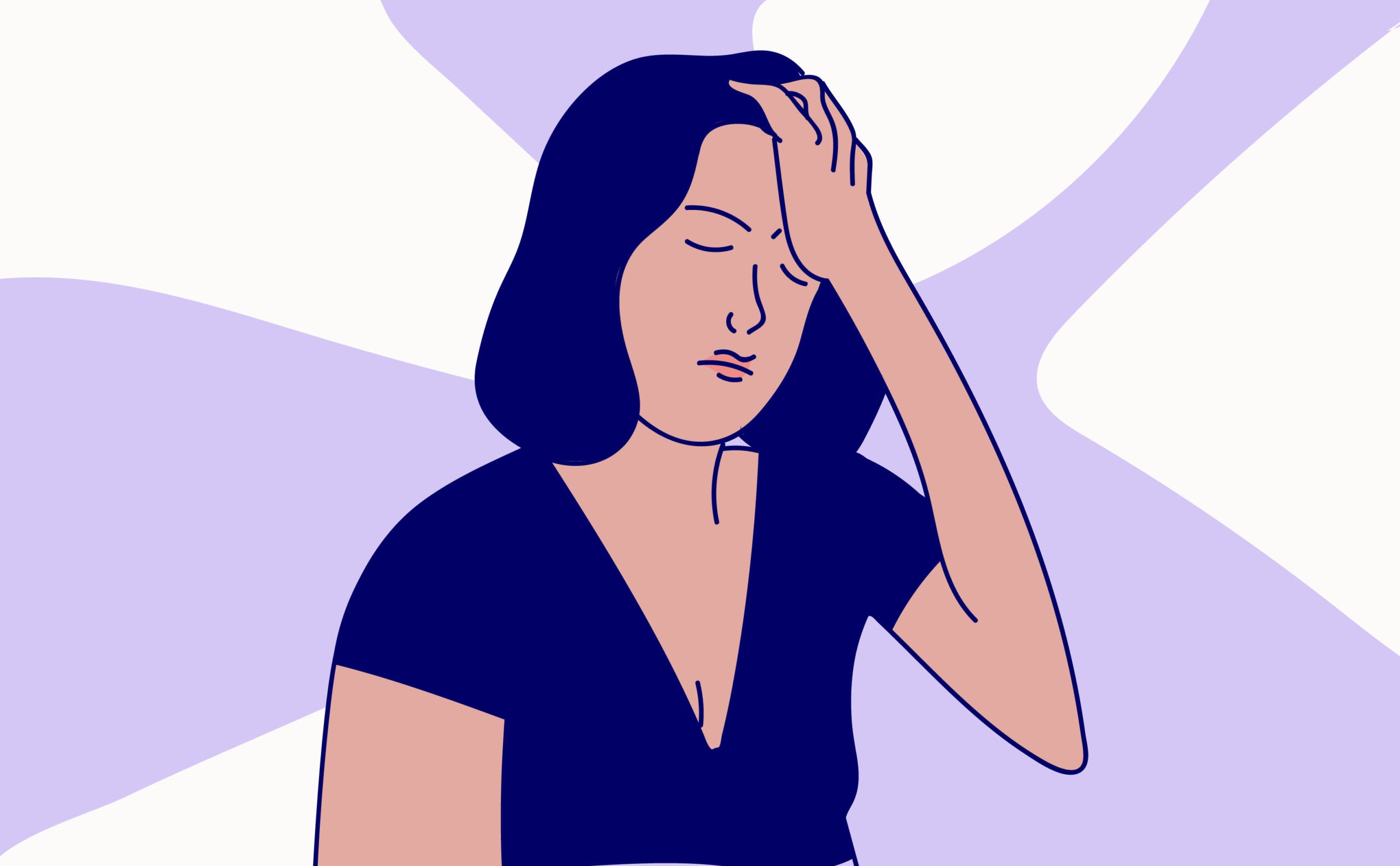Dizziness, according to the United States National Library of Medicine, is defined as… ”a sense of spatial disorientation, motion of the environment, or lightheadedness.”
It’s often used interchangeably for terms such as:
- Vertigo: feeling a loss of balance (like the world is spinning)
- Presyncope: the sensation that you’re going to faint (but you don’t)
- Disequilibrium: the sensation that you’ve lost your stability and are going to fall
Although one specific cause of dizziness among menopausal women hasn’t yet been established, several hypotheses have been proposed, including the role estrogen plays in our neurosensory system.
Anxiety
Anxiety is a common symptom of menopause that can go hand in hand with dizziness. In fact, there is an established, bi-directional relationship between the two. In other words, dizziness can cause anxiety and anxiety can cause dizziness.
To learn more about the symptoms, causes, and treatment of anxiety, refer to our complete guide.
Inner ear changes
There is growing evidence that estrogen, in addition to its many other functions, also plays an important neurosensory role in our nervous system. Fluctuating and then declining hormone levels during menopause, specifically levels of estrogen, may cause changes in our “otoconia,” the inner part of the ear that helps us maintain balance. This explains why there’s a higher prevalence of benign paroxysmal positional vertigo (otherwise known as BPPV…much easier to remember!), a type of vertigo characterized by short, frequent bouts of dizziness, among older women.
Migraines
The hormonal fluctuations in estrogen and progesterone which begin during perimenopause can amplify both the frequency and duration of headaches and, in more severe cases, migraines. And for some, migraines don’t necessarily cause pain, but rather, they manifest as dizziness. These are called vestibular migraines, and are treated similarly to the regular type.
To learn more about the symptoms, causes, and treatment of headaches during menopause (as well as how to differentiate between headaches and migraines), refer to our complete guide.
Physiological changes
There are certain physiological changes that occur during a hot flash (or flush, for the British) / night sweat, specifically increased heart rate and heart palpitations. It is postulated that these occur as the body’s response to a decrease in blood pressure that may come with vasomotor symptoms, which in turn will cause increased heart rate, which may be perceived as heart palpitations. A sudden decrease in blood pressure is then felt as symptoms of dizziness. In this example “dizziness” is not of the “vertigo” or “room spinning” category but rather is experienced as lightheadedness or even impending sense of fainting.
Speaking of vasomotor symptom (ie hot flashes/night sweats) studies also show that more severe the symptoms correlate with more dizziness. And, although data is still limited, there seems to be a trend towards faster resolution of dizziness in women treated with hormone therapy.
Medications
We also need to be aware that some medications can commonly cause dizziness as a side effect. For example, if you are taking something for high blood pressure, dizziness may signal a dose that is too high for you (i.e., it’s causing your blood pressure to get too LOW). If this sounds like you, definitely bring it up to your doctor. Closer to the world of menopause treatments, sometimes menopause hormone therapy (previously called hormone replacement therapy or HRT), can cause dizziness. This usually passes but if not, this is also something to talk to your provider about so you can tweak your dose.
Of course, there’s a possibility that symptoms of dizziness are NOT related to menopausal hormonal changes but are instead caused by things such as low blood sugar or blood pressure, medications, inner ear disorders, or neurological conditions (just to name a few), so it’s important to seek medical help if symptoms worsen, persist, or affect your quality of life.
If you experience dizziness during heavy periods, especially if you’re passing blood clots, this may be a sign of significant blood loss and anemia. This too, would be the time to go see your provider.
Dr. Anna Barbieri, MD
Pro tip #1
Experiencing dizziness that’s 1) sudden or 2) risking your safety? Note how your symptoms feel and relay that information to your women’s health or primary care healthcare provider in order to help them identify a possible cause. Common “types” of dizziness include:




